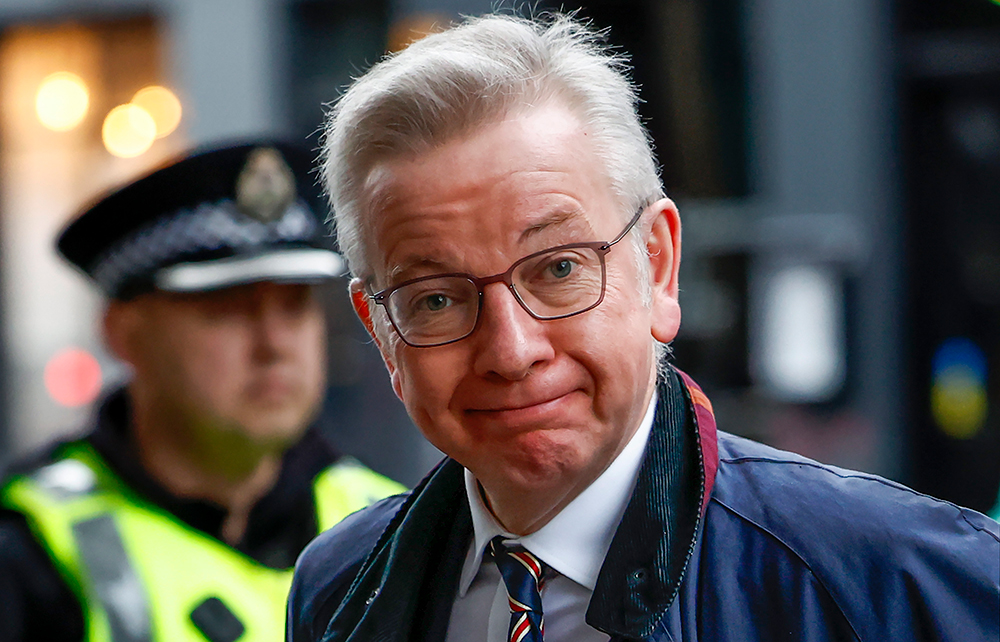Now that Sir Keir Starmer has reaffirmed he is a socialist, interviewers are asking other leading Labour figures if they are too. The shadow business secretary, Jonathan Reynolds, explains he is a Christian socialist, which makes me want to go back to Sir Keir, an unbeliever, and ask him how he thinks his atheist socialism differs from Marxism. Socialism is in essence an economic doctrine about the common ownership of (to use the famous Clause 4 wording) ‘the means of production, distribution and exchange’. How does Sir Keir believe that common ownership should be achieved? He may not want to say. It would be equally reasonable – and equally awkward politically – to ask Rishi Sunak whether he is a capitalist. I should like to know, because their answers might clarify the current confusion in which Tories hint at approval of socialist principles and Labour of capitalist ones, without quite saying what they mean.
I join the tributes to Michael Gove as he leaves parliament. He has been the longest-serving British cabinet minister since Lord Hailsham left in 1987, and one of the subtlest, most innovative and (in private) funniest. I must admit, though, to a sense of frustration. Michael is opaque, and likes to be. He is also, I suspect, ‘on a journey’. He might not go so far as to join the Labour party, but I would not be at all surprised if he were soon tasked by a Labour government with some interesting role designed to weaken Tory morale yet further – chairing the BBC, perhaps?
As we took our places at Frank Field’s funeral in Holy Trinity, Sloane Street, on Wednesday last week, rumour of an election announcement began to circulate. Frank would have enjoyed that. I found myself sitting next to Wes Streeting, with Ben Bradshaw and Dame Margaret Hodge nearby, and said I was pleased to see Labour represented since Frank’s relationship with his former party had ended in acrimony. He grinned and explained: ‘We’re here by invitation.’ Uniquely – in my experience – this was a funeral to which the congregation had been bidden by the deceased, Frank having left a list. So there was particular interest in who was not present e.g. Sir Tony Blair, and Jeremy Corbyn whom, in a moment of madness, Frank had nominated for the Labour leadership contest of 2015. Those present included Mr Speaker Hoyle, Archbishop George Carey, the Marquess of Salisbury, and the man who runs the Laughing Halibut, Frank’s favoured fish-and-chip shop in Strutton Ground. It was a touching Anglo-Catholic occasion, Frank being catholic in the ecclesiastical and vernacular senses.
The next day, I took the train to Chippenham for the memorial service of Captain Ian Farquhar, Master of the Beaufort Hunt for 34 years, relinquishing the horn after 26 of them. The church at Badminton, a rural version of St Martin-in-the-Fields, was brimful with 300 people (largely invisible in the box pews). Outside were 700 more, listening to loudspeakers. The Queen was there, sharing a pew with her former husband, Andrew Parker Bowles. Staring at the back of my head was Henry, 1st Duke of Beaufort, as rendered by Grinling Gibbons, and I faced a row of men who, I quickly worked out by their stiff gait and respectful but slightly uneasy way of wearing dark suits, were retired hunt servants. Two of Ian’s granddaughters recited ‘Running on’ by W.H. Ogilvie and one of his daughters sang ‘Danny Boy’. Ann Mallalieu read the passage from Revelation about ‘the first heaven and the first earth’, and it occurred to me that the phrase ‘the first earth’ would contain a different meaning for a man like Ian who worked with hounds. It would be hard to think of an occasion so full of people to whom modern electoral politics offers almost nothing and yet who are essential England.
The European Union Entry-Exit System (EES) for non-EU citizens is insisting, from October, that those wishing to get the Eurostar from St Pancras must first be fingerprinted and upload a photograph there before boarding the train. This will be a great bore: there will be queues for the 49 booths erected for the purpose. Each victim will have to pay €7. Even the French who, in principle, are not upset by causing the British inconvenience, are worrying about the potential delays. I have a partial solution (not uninfluenced by the fact that we live in East Sussex). Because of its losses during Covid, Eurostar suspended the international elements of two stations – Ebbsfleet and Ashford – which had until then been part of the promised regeneration of Kent. It half-promised they would return in 2025. Now is surely the moment to make good on this, putting up booths at those two stations which will process you much faster than the London terminal and offering once more, from Ashford, the quickest possible train journey to France. I wonder, by the way, if the EES problem influenced Rishi Sunak’s decision to call the election earlier than expected. New pictures of hours-long waits shortly before an autumn polling day would have been the least helpful way of reminding voters about Brexit.
P.S. Wise after the event, I add three points about Mr Sunak’s soaking outside Downing Street. 1) It might have looked a bit pompous if an official had held an umbrella over the Prime Minister as he spoke, but mightn’t it have been rather touching if his wife had done so? 2) If Mr Sunak was insisting on braving the elements unprotected, he would have done much better not to wear a lightweight suit which let the water sink straight in. The stout worsteds that prime ministers such as Churchill or Harold Macmillan wore, come rain or shine, were quite heavy enough to repel water for ten minutes. 3) Why do prime ministers now feel they must announce elections outside Downing Street and gild the news with a speech from a lectern? This is an unnecessary 21st-century innovation, asking for trouble.








Comments